Floriana
Floriana (Maltese: Il-Furjana or Il-Floriana), also known by its title Borgo Vilhena, is a fortified town in the South Eastern Region area of Malta, just outside the capital city Valletta. It has a population of 2,205 as of March 2014.[1] Floriana is the birthplace of many famous Maltese, amongst which the composer of the national anthem, 'L-Innu Malti', Robert Samut; former Bishop of Malta Dun Mauro Caruana, the poets Oliver Friggieri and Maria Grech Ganado, the writer and politician Herbert Ganado and Swedish Idol winner Kevin Borg.
Floriana
Il-Furjana/Il-Floriana Borgo Vilhena | |
|---|---|
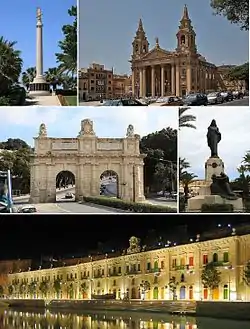 From top: Malta Memorial, St. Publius Parish Church, Porte des Bombes, Christ the King Monument, Valletta Waterfront | |
 Flag 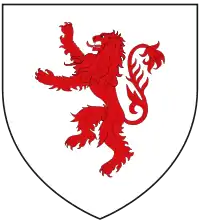 Coat of arms | |
| Etymology: Pietro Paolo Floriani | |
| Motto(s): Flores mulcent aurae educat imber | |
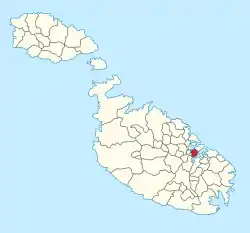 | |
| Coordinates: 35°53′36″N 14°30′21″E | |
| Country | |
| Region | South Eastern Region |
| District | Southern Harbour District |
| Established | 1724 |
| Founded by | António Manoel de Vilhena |
| Borders | Ħamrun, Marsa, Pietà, Valletta |
| Government | |
| • Mayor | Davina Sammut Hili (PL) |
| Area | |
| • Total | 0.94 km2 (0.36 sq mi) |
| Elevation | 38 m (125 ft) |
| Population (Jan. 2019) | |
| • Total | 2,032 |
| • Density | 2,200/km2 (5,600/sq mi) |
| Demonym(s) | Furjaniż (m), Furjaniża (f), Furjaniżi (pl) |
| Time zone | UTC+1 (CET) |
| • Summer (DST) | UTC+2 (CEST) |
| Postal code | FRN |
| Dialing code | 356 |
| ISO 3166 code | MT-09 |
| Patron saint | St. Publius |
| Day of festa | 22 January |
| Website | www |
Etymology
Floriana is named after Pietro Paolo Floriani, an Italian military engineer who designed the Floriana Lines, the line of fortifications surrounding the town.[2] In Maltese, the town is called Il-Floriana by the local council.[3] However, it is popularly known as Il-Furjana,[4] and the latter is regarded as the official name by the National Council for the Maltese Language.[5] Government sources use both variants.[1][6]
The town's original official name was Borgo Vilhena (or Subborgo Vilhena) after Grand Master António Manoel de Vilhena,[2] but the name fell out of use in favour of Floriana or Furjana.[4] The name Borgo Vilhena is now used as a title, just like Valletta has the title Città Umilissima.
History

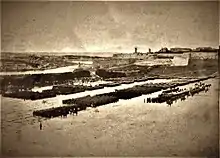
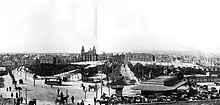
The origins of Floriana go back to 1636, when construction of the Floriana Lines commenced. The line of fortifications was built outside the fortifications of Valletta as an outer defensive line for the capital city. The lines were named after Pietro Paolo Floriani, the Italian military engineer who had designed them. The fortifications were partially defensible by 1640,[7] but construction and modifications continued throughout the 17th and 18th century, being fully completed in the 1720s.[8]
The area between the Floriana Lines and the Valletta Land Front began to be built up in 1724, when Grand Master António Manoel de Vilhena founded the suburb Borgo Vilhena.[9]
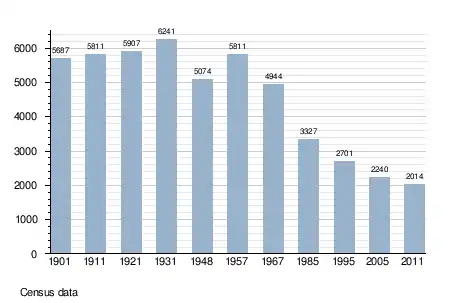
Sports
The Assoċjazzjoni Sport Floriana, or Floriana Sports Association, sponsors a number of sports in the town, as well as hosting the Floriana Supporters Club. Sporting clubs include:
- Floriana Football Club which was the most successful football club in Malta throughout the 20th century
- Floriana Amateur Football Club
- Floriana Basketball Club
- Klabb Boċċi Floriana (trans.: Floriana Bocce Club)
- Young Stars Hockey Club
- Floriana AFC
The Vikings Sailing Club is also located in Floriana, though it is not associated with the Sports Association.
Patron saint
Saint Publius is one of the patron saints of Malta and also the patron saint of Floriana. The Archipresbyteral Church of Floriana is dedicated to Saint Publius, traditionally acclaimed as the first Bishop of Malta.
According to Maltese folklore, Publius supposedly lived in Malta and at one point received the Apostle Paul after the shipwreck in 60 A.D. (Acts of the Apostles 28:1–10).
Publius is considered as the first Maltese saint and thus the devotion he enjoys among locals.
Pope John Paul II spoke at St. Publius Square during his two visits to Malta, and on his second visit he held the beatification of three Maltese:
- Saint Ġorġ Preca (founder of the Society of Christian Doctrine)
- Nazju Falzon
- Maria Adeodata Pisani
Main sights
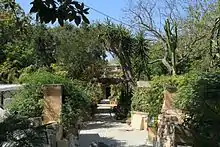
- St. Publius Parish Church
- St. Publius Square, including the Granaries[10]
- The Mall Gardens
- The Floriana Lines, including Porte des Bombes
- Wignacourt Water Tower
- Sarria Church
- Robert Samut Hall
- The Valletta Waterfront, including the Church of the Flight into Egypt
- War Memorial
- Malta Memorial
- King George V Recreational Grounds
- Argotti Botanical Gardens
- Sir Luigi Preziosi Gardens
- Vilhena Gardens
- Polverista
- St. Philip's Garden
- Herbert Ganado Gardens
- Jubilee Grove (which demarcates the town from Ħamrun and Pietà)
- Msida Bastion Historic Garden, near Hay Wharf, another landmark which has been restored and reportedly contains the grave of Mikiel Anton Vassalli, an 18th-century writer and reformer who is much associated with Malta's national identity.
- Hydrofoil terminal, which is very busy during summertime with daily departures to Sicily.
Village Core
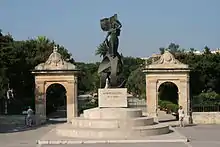
- Pjazza Emm. S. Tonna (E.S. Tonna Square)
- Pjazza San Kalċidonju (St. Calcidonio Square)
- Triq il-Konservatorju (Conservatory Street)
- Triq il-Mall (Maglio Street)
- Triq il-Miratur (Gunlayer Street)
- Triq is-Suq (Market Street)
- Triq l-Argotti (Argotti Street)
- Triq l-Iljun (Lion Street)
- Triq l-Isqof M. Caruana (Bishop M. Caruana Street)
- Triq San Publju (St. Publius Street)
- Triq San Tumas (St. Thomas Street)
- Triq Sarria (Sarria Street)
- Trejqet il-Fosos
Government
.svg.png.webp)
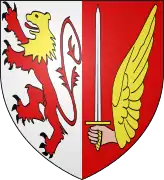
Floriana is a leading administrative centre, hosting the Ministry and Dept of Education, the Ministry for Resources and Rural Affairs, Police Headquarters and the Public Works Dept, The Licensing and Testing Office, and Land Transport Directorate of Transport Malta, as well as other financial and commercial companies spread around the former Colonial Administrative Area of Belt-is-Sebħ. The National Audit Office along with the Department of Contracts and the Malta Environment and Planning Authority, are located in two ravelins, Notre Dame and St. Francis, respectively.
The Floriana Local Council was established in 1993 along with Malta's other local councils to administer the town. It is located at Emmanuel S. Tonna Square. The following people have served as mayor since the post was created in 1994:
- Publio Agius (1994–98)
- Nigel Holland (1998–2004)
- John Mary Brincat (2004)
- Publio Agius (2004–07)
- Nigel Holland (2007–12)
- Davina Sammut (2012–12)
- Nigel Holland (2012–15)
- Davina Sammut Hili (2015–present)
Current Councillors that are serving from 2015–19:
- James Aaron Ellul (PN)
- Vince Borg (PL)
- Albert de Marco (PL)
- Anthony Grech Sant (PN)
Lodging and entertainment
Floriana is home to the Hotel Phoenicia, one of the oldest and most prestigious hotels on Malta, as well as the 5 star luxury Hotel; and the Grand Hotel Excelsior.
Today it holds a huge number of boutique hotels.
The annual Isle of MTV music festival has been held in Floriana since 2007.[11]
Carnival
Floriana is the scene of the Maltese Carnival, held in St. Anne's Street in February leading up to Lent.
Climate
Floriana features a Mediterranean climate with warm, dry summers and mild, wet winters. Floriana experiences a lack of precipitation during the summer months and heavier precipitation during the winter months. Winter temperatures are moderated by the city’s proximity to the sea. As a result, Floriana enjoys mild winters, however windy in some areas. The official climate recording station in Malta is at Luqa Airport, which is a few miles inland from Floriana. Average high temperatures range from around 16 °C (61 °F) in January to about 32 °C (90 °F) in August, while average low temperatures range from around 10 °C (50 °F) in January to 23 °C (73 °F) in August. The Köppen Climate Classification subtype for this climate is "Csa" (Mediterranean Climate).
| Climate data for Luqa, Malta 1981-2010 (Records 1947-2010) | |||||||||||||
|---|---|---|---|---|---|---|---|---|---|---|---|---|---|
| Month | Jan | Feb | Mar | Apr | May | Jun | Jul | Aug | Sep | Oct | Nov | Dec | Year |
| Record high °C (°F) | 22.2 (72.0) |
26.7 (80.1) |
33.5 (92.3) |
30.7 (87.3) |
35.3 (95.5) |
40.1 (104.2) |
42.7 (108.9) |
43.8 (110.8) |
37.4 (99.3) |
34.5 (94.1) |
28.2 (82.8) |
24.3 (75.7) |
43.8 (110.8) |
| Average high °C (°F) | 15.6 (60.1) |
15.6 (60.1) |
17.3 (63.1) |
19.8 (67.6) |
24.1 (75.4) |
28.6 (83.5) |
31.5 (88.7) |
31.8 (89.2) |
28.5 (83.3) |
25.0 (77.0) |
20.7 (69.3) |
17.1 (62.8) |
23.0 (73.3) |
| Daily mean °C (°F) | 12.8 (55.0) |
12.5 (54.5) |
13.9 (57.0) |
16.1 (61.0) |
19.8 (67.6) |
23.9 (75.0) |
26.6 (79.9) |
27.2 (81.0) |
24.7 (76.5) |
21.5 (70.7) |
17.7 (63.9) |
14.4 (57.9) |
19.3 (66.7) |
| Average low °C (°F) | 9.9 (49.8) |
9.4 (48.9) |
10.6 (51.1) |
12.4 (54.3) |
15.4 (59.7) |
19.1 (66.4) |
21.7 (71.1) |
22.6 (72.7) |
20.8 (69.4) |
18.1 (64.6) |
14.6 (58.3) |
11.6 (52.9) |
15.5 (59.9) |
| Record low °C (°F) | 1.4 (34.5) |
1.7 (35.1) |
2.2 (36.0) |
4.4 (39.9) |
8.0 (46.4) |
12.6 (54.7) |
15.5 (59.9) |
15.9 (60.6) |
13.2 (55.8) |
8.0 (46.4) |
5.0 (41.0) |
3.6 (38.5) |
1.4 (34.5) |
| Average precipitation mm (inches) | 98.5 (3.88) |
60.1 (2.37) |
44.2 (1.74) |
20.7 (0.81) |
16.0 (0.63) |
4.6 (0.18) |
0.3 (0.01) |
12.8 (0.50) |
58.6 (2.31) |
82.9 (3.26) |
92.3 (3.63) |
109.2 (4.30) |
600.2 (23.62) |
| Average relative humidity (%) | 79 | 79 | 79 | 77 | 74 | 71 | 69 | 73 | 77 | 78 | 77 | 79 | 76 |
| Mean monthly sunshine hours | 176.7 | 194.3 | 235.6 | 261.0 | 310.0 | 351.0 | 384.4 | 362.7 | 282.0 | 220.1 | 189.0 | 164.3 | 3,131.1 |
| Source 1: Meteo Climate (1981-2010 Data),[12] climatetemp.info (Sun Data)[13] | |||||||||||||
| Source 2: NSO Malta[14] | |||||||||||||
Music
- Vilhena Band Club (Soċjetà Filarmonika Vilhena) was founded in 1874. The first musical director of the band was Mro. Giuseppe Borg, and the first president of the Society was Baldassare Portanier.
- Kevin Borg a Maltese singer and Swedish Idol 2008 winner was born in the town. He moved to Arvidsjaur, Sweden in late 2007 to live with his girlfriend and was soon cast as a contestant on the Swedish Idol series.
Floriana community services
- St. Publius Parish Church, Triq Sarria (Sarria Street)
- Floriana Local Council, Pjazza Emanuel S. Tonna (Emanuel S. Tonna Square)
- Floriana Police Station, Triq Sant' Anna (St. Anne Street)
- Floriana Malta Labour Party Club, Triq Sant' Anna (St. Anne Street)
- Floriana Partit Nazzjonalista Club, Pjazza Sant' Anna (St. Anne Square)
- Sir Paul Boffa Hospital, Sqaq Ħarper (Harper Lane)
- Floriana Health Centre, Triq Franġisk Saver Fenech (Frances Xavier Fenech Street)
- Central Public Library, Triq Joseph J. Mangion (J.J. Mangion Street)
Zones in Floriana
- Balzunetta Named after Barcelonnette in Spain, hence translated to " Balzunetta"
- Belt il-Ħażna, limits of Blata l-Bajda
- Belt-is-Sebħ
- Msida Bastions
- Crown Works, limits of Blata l-Bajda
- Fuq il-Biskuttin
- Foss Horns
- Foss Notre Dame
- Ġnien tal-Milorda
- Il-Funtana ta' Tritoni (Triton Fountain (Malta))
- Hay Wharf (Xatt it-Tiben)
- The Granaries (Pjazza San Publju/Il-Fosos )
- Il-Mall
- Independence Arena (Xagħra tal-Furjana)
- Jubilee Grove
- Sa Maison
- Sarria
- Tal-Bombi
- Valletta Waterfront/Pinto Wharf (Xatt ta' Pinto)
- Xatt il-Kanuni
The Granaries (Pjazza San Publju - il-Fosos)
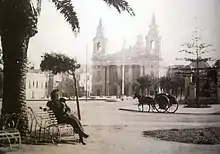
Granaries are pits dug into the ground and covered by circular stone slabs. They were primarily used for the storage of Grain. Granaries can be found throughout Valletta and Floriana. The first granaries were built by the Knights to provide for storage within the fortifications in case of a siege. As the system of storage was reliable and efficient, the British authorities copied in all details the Knights’ granaries. The Granaries proved their worth as they continued to provide grain for the starving population during World War 2. The highest grouping of granaries (a total of 76) is found here.
‘Il-Fosos’ or The Granaries and now officially named Pjazza San Publju, is also one of the largest urban open spaces in Malta and is therefore use for mass gatherings. One important gathering was held in May 1990 during the Pope John Paul II visit to Malta. During the second Papal visit on 9 May 2001, the Pope beatified three Maltese in this square, one of whom was eventually canonised (St Gorg Preca). As Malta is a predominantly Catholic country, this is considered to be an important event in Malta’s history. A third papal visit took place on 18 April 2010 by Pope Benedict XVI. The Isle of MTV summer festival is among other major events held here.
Notable people
- Edwin Busuttil, politician and public figure
- Oliver Friggieri, author, lecturer
- Henry Frendo, historian, lecturer
- Peppi Azzopardi, producer, TV Presenter
- Michael Frendo, politician
- Maria Grech Ganado, writer, lecturer
- Robert Samut, music writer, doctor
- Filippo Sciberras, politician
- Kevin Borg, singer
- Mauro Caruana, bishop
- James Aaron Ellul, politician, journalist & presenter
- Mario Xuereb, journalist & presenter
- Sammy Galea, composer, musician
- Dominic Galea, composer, musician
- John Holland, footballer
References
- "Estimated Population by Locality 31st March, 2014". Government of Malta. 16 May 2014. Archived from the original on 21 June 2015.
- Armstrong, Gary; Mitchell, Jon P. (2008). Global and Local Football: Politics and Europeanization on the Fringes of the EU. Routledge. p. 44. ISBN 9781134269198.
- "Floriana". lc.gov.mt (in Maltese). Archived from the original on 16 July 2016.
- Cassar Pullicino, Joseph (October–December 1949). "The Order of St. John in Maltese folk-memory" (PDF). Scientia. 15 (4): 163. Archived from the original (PDF) on 17 April 2016.
- "Il-lokalitajiet Maltin" (PDF). National Council for the Maltese Language (in Maltese). p. 2. Archived from the original (PDF) on 2 June 2016.
- "Kumitat għar-Rijabilitazzjoni tal-Belt Valletta u l-Floriana". Government of Malta (in Maltese). Archived from the original on 16 July 2016.
- Adami, Giuseppe (1997). "FLORIANI, Pietro Paolo". Dizionario Biografico degli Italiani (in Italian). 48. Archived from the original on 5 March 2016.
- Spiteri, Stephen C. (2004–2007). "The Development of the Bastion of Provence, Floriana Lines" (PDF). Arx – Online Journal of Military Architecture and Fortification (1–4): 24–32. Archived from the original (PDF) on 15 November 2015.
- Rix, Juliet (2013). Malta and Gozo. Bradt Travel Guides. p. 148. ISBN 9781841624525.
- Morana, Martin (2011). Bejn Kliem u Storja (in Maltese). Malta: Books Distributors Limited. ISBN 978-99957-0137-6. Archived from the original on 20 October 2016.
- "Isle of MTV Malta Special". visitMALTA.com. Retrieved 6 July 2015.
- "Luqa Weather Averages 1981-2010". Meteo-climat-bzh.dyndns.org. Retrieved 17 July 2017.
- "Sunshine & Daylight Hours in Luqa, Malta Sunlight, Cloud & Day length". Malta.climatemps.com. Retrieved 1 June 2015.
- Galdies, Charles (2011). "The Climate of Malta: statistics, trends and analysis 1951-2010". Floriana: National Statistics Office. Archived from the original on 13 November 2014.
- Quest for regeneration of Floriana 7 April 2015.
External links
| Wikimedia Commons has media related to Floriana. |